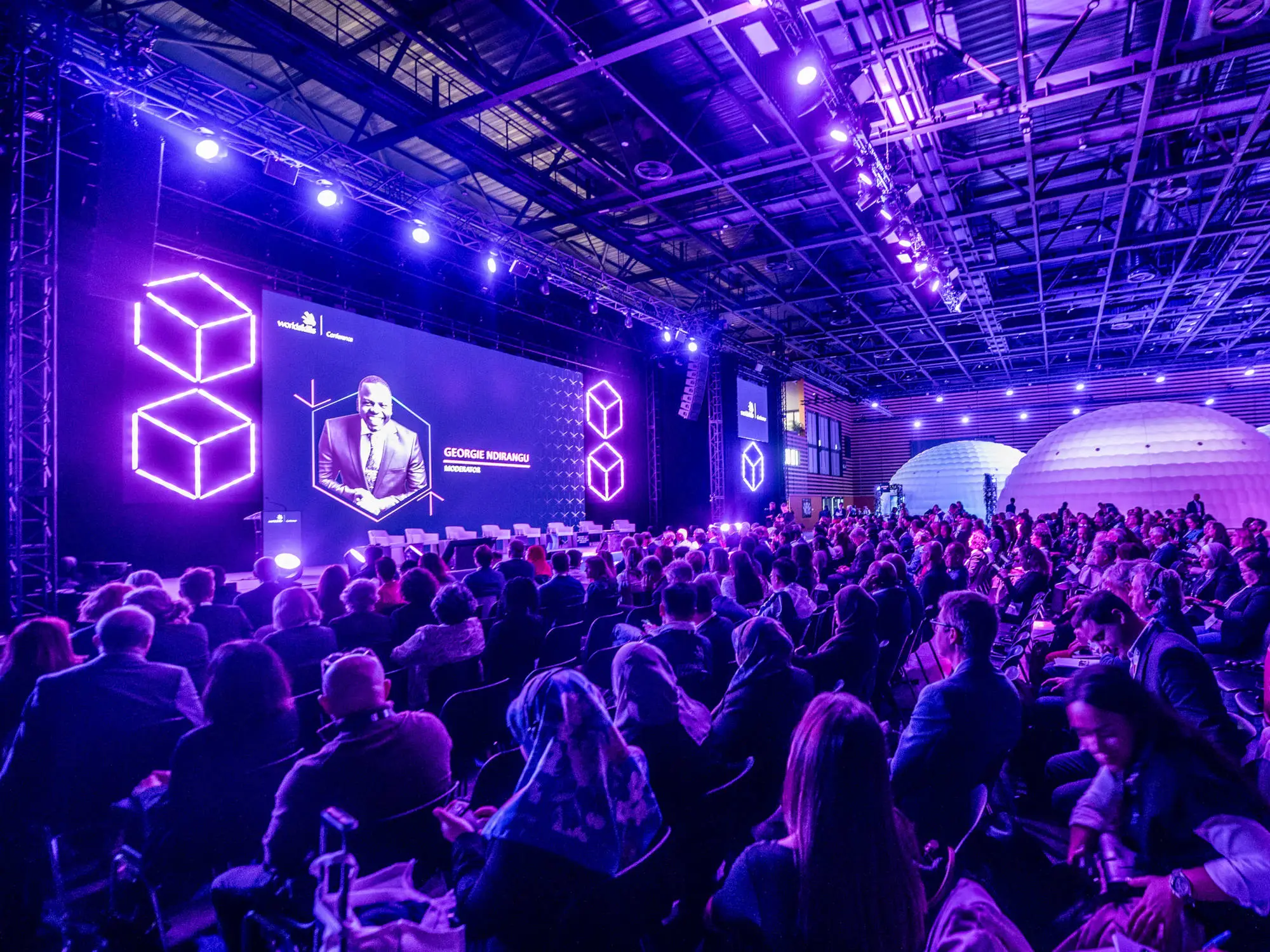WorldSkills Conference 2024: Moving TVET to the Top of the Global Agenda takes place 11-12 September 2024 in Lyon, France. 🇫🇷
Over the next two days, we will be sharing Conference insights “live” on this page—covering key points from each session featuring a remarkable line-up of speakers from all over the world, representing a diverse range of experiences and expertise, a global community helping shape the future of skills and Technical Vocational and Training!
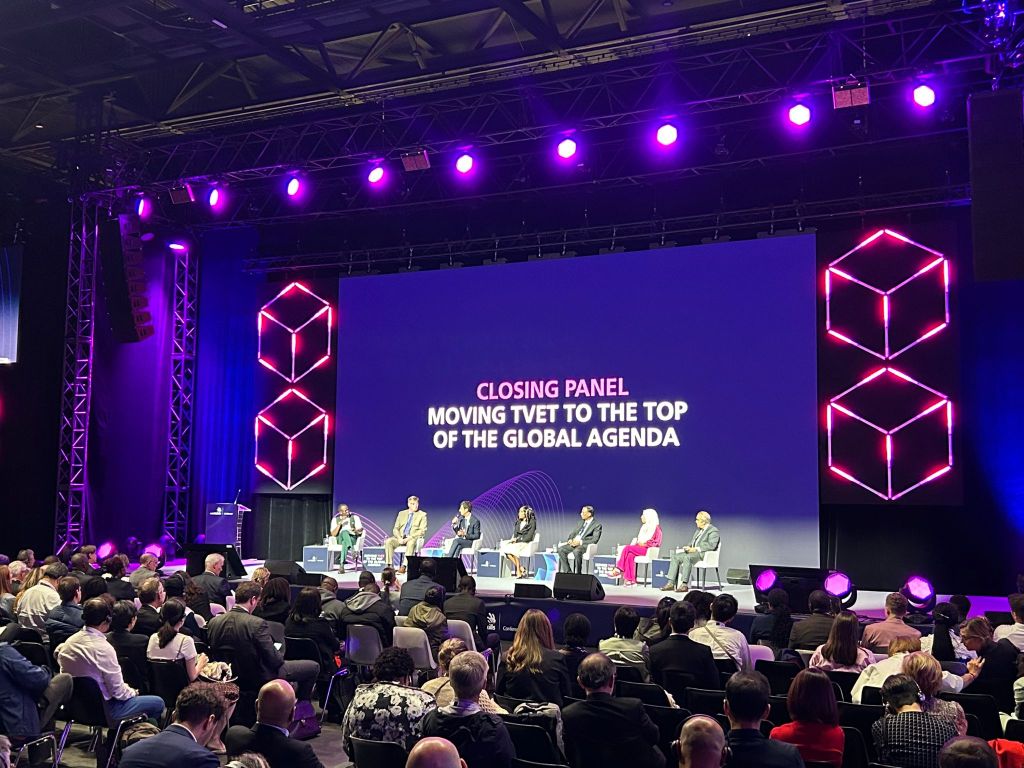
5 p.m.
To close out two packed days of inspiring and insightful conversation, moderator Georgie Ndirangu asked Closing panelists for one sentence on what they commit to in efforts to move TVET to the top of the global agenda.
- “I commit to coming back to a WorldSkills Competition, national and international, and I commit to ensuring that, at the end of middle school, young people know about 50 different jobs. Today it is about 10.” – Geoffroy de Vitry, High Commissioner for Vocational Education and Training, France.
- “I commit to ensuring that we improve the awareness and the importance of skills training. There have been conversations about the stigma that is associated with that and I think having that private sector step up and say these skills are incredibly valuable, these skills are useful and we hire fro these skills I think will help shift that negative perception. I commit to doing my part and that Autodesk is doing their part to not only promote but hire for these skills. – Dara Treseder, Chief Marketing Officer, Autodesk
- “I commit to promoting more and new global partnerships on skills.” – Srinivas B. Reddy, Chief of Skills and Employability Branch, International Labour Organization ILO
- “I commit to over the next year making skills achievement and attainment as prestigious as any other attainment because I think we haven’t made skills as prestigious as we should be.” – Marty Guay, Vice President, Business Development, Stanley Black & Decker
- “I commit to work with colleagues, with WorldSkills, to ensure skills remain high in the agenda.” – Borhene Chakroun, Director for Policies and Lifelong Learning Systems, UNESCO
- “I commit to always being the voice of youth and always available for advocating for youth and helping youth to achieve their passion and follow their passion.” – Yousra Assali, WorldSkills Representative for MENA
Insights from day 2
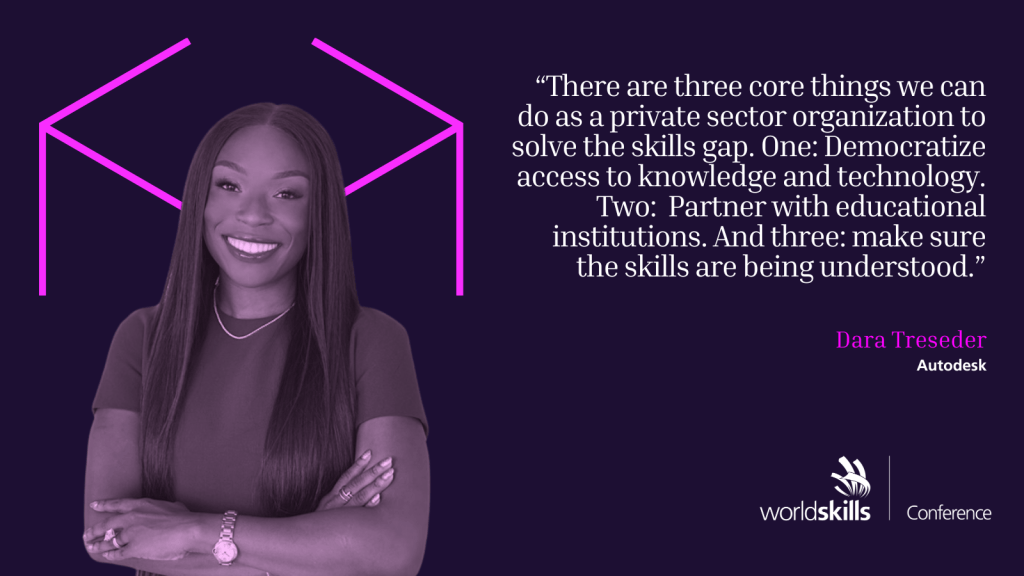
4:30 p.m.
Dara Treseder Chief Marketing Officer of Autodesk says:
“Why is the private sector participating in this conversation? As industry and tech leaders, we shape a lot of what happens in society. Let’s take Autodesk: our software is used to design and build the world around us. There is one common thread across all the industries: there is a skills gap. Clearly we know that education is critical, but that skills gap is real. So how will we solve the problem? There are three core things we can do as a private sector organization:
- Democratize access to knowledge and technology
- Partner with educational institutions
- Make sure the skills are being understood
Srinivas B. Reddy Chief of Skills and Employability Branch of the International Labour Organization ILO says:
“What we need to see is a skills revolution.”
“It requires massive public momentum and social change, removing stigma around skilled careers. We need to see political leaders at the highest level in conferences like this one, to translate these calls into commitments and actually deliver.”
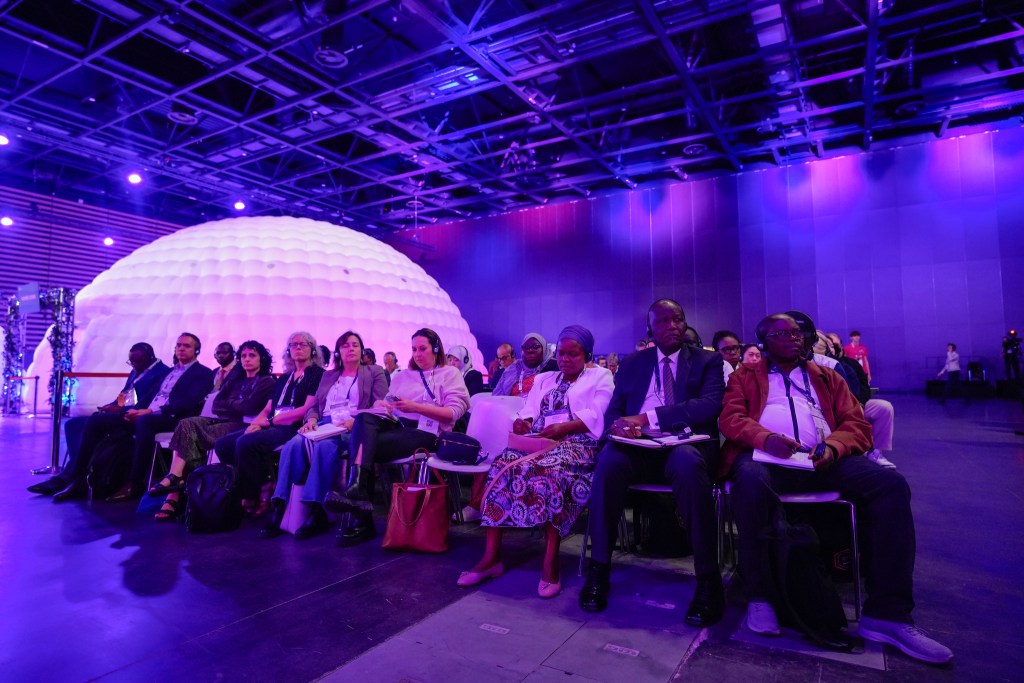
4 p.m.
Day 2 is coming to an end…
The Closing Panel of WorldSkills Conference 2024 will begin shortly!
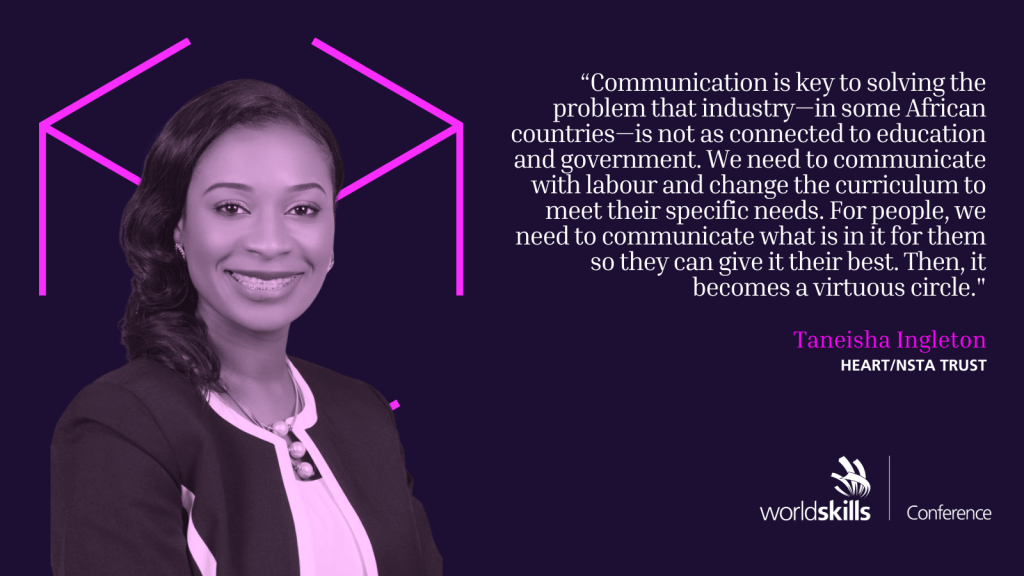
3:40 p.m.
From competition to transformation: How WorldSkills can advance TVET in low-and middle-income countries
“Communication is key to solving the problem that industry, in some African countries, is not as connected to education and government. We need to communicate with labour and change the curriculum to meet their specific needs. For people, we need to communicate what is in it for them so they can give it their best. Then, it becomes a virtuous circle,” said Taneisha Ingleton Managing Director, HEART/NSTA TRUST.
“Leveraging the connection between industry and education requires changing the model of engagement with development partners and industry. We need to connect industry experts with our TVET system. If they are all a part of the conversation, they will be able to understand the challenges. Skills are critical when it comes to competitiveness globally, and we need industry to see that,” said Dr. Kipkirui Langat CEO, WorldSkills Kenya.
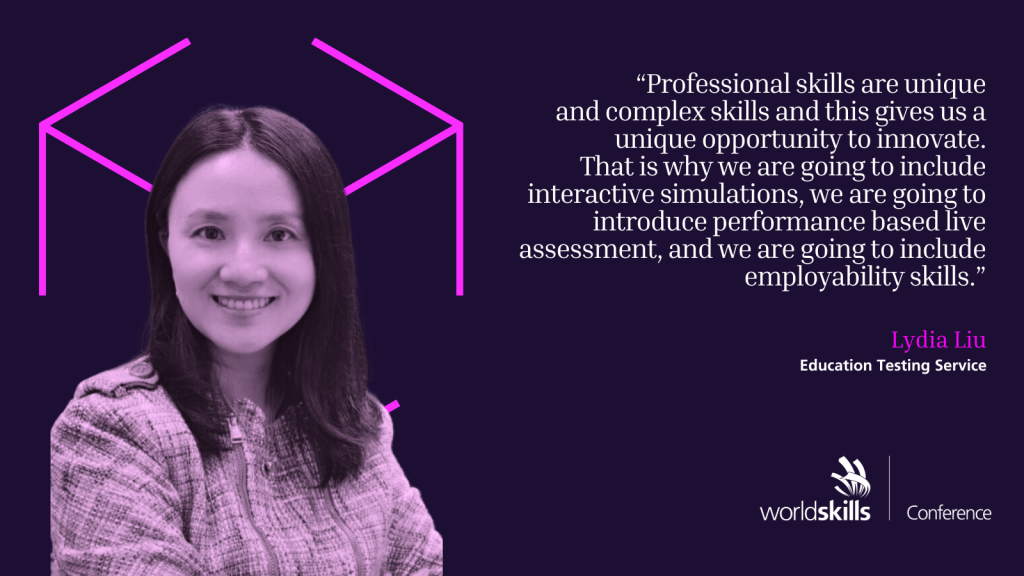
3:15 p.m.
Unveiling PISA-VET: Progress and Achievements
“Professional skills are unique and complex skills and this gives us a unique opportunity to innovate. That is why we are going to include interactive simulations, we are going to introduce performance based live assessment, and we are going to include employability skills. Skills such as effective communications, collaboration, conscientiousness, and a range of life skills that matter to the TVET occupations,” said Lydia Liu Associate Vice President, Research, Education Testing Service ETS.
David Hoey, CEO of WorldSkills, says: “The OECD PISA system and WorldSkills performance assessments are very complimentary. We want to marry the two together and scale. A rising tide lifts all boats and our hope is that this partnership can benefit all.”
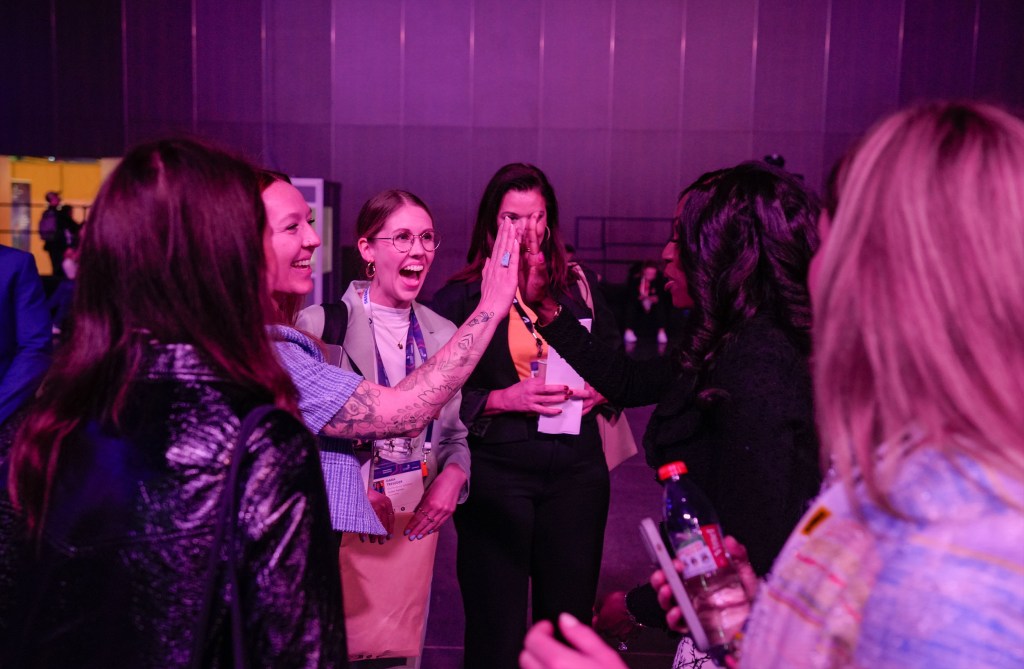
2 p.m.
Breaks in between sessions for some networking and idea exchange!
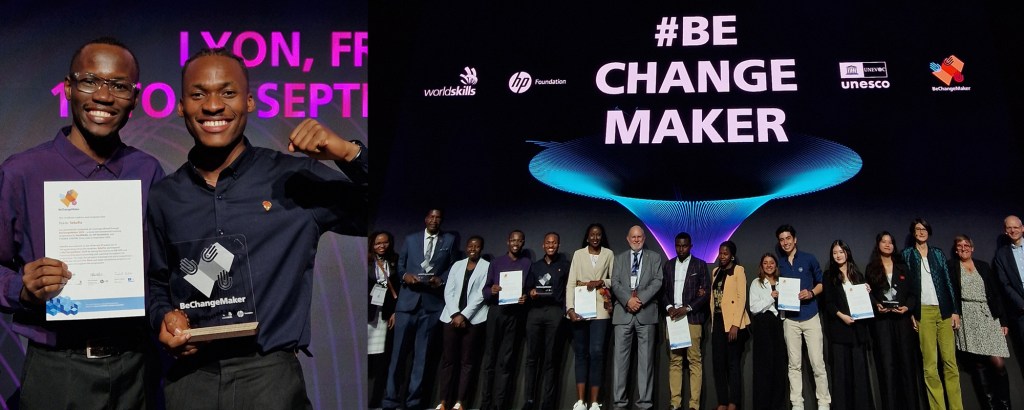
1:50 p.m.
Congratulations to BeChangeMaker winners Sekofia (1st place), RiceUp (2nd place), and Planet Plus (3rd place) who each receive EUR 2,000 cash.
In addition, all Top 5 teams (Holly and CarePlug) receive EUR 1,000 worth of customized post-programme training from WorldSkills and HP LIFE Foundation to support their businesses, along with a feature in UNESCO-UNEVOC’s publications, and invitations to join UNESCO-UNEVOC events. #WSC2024
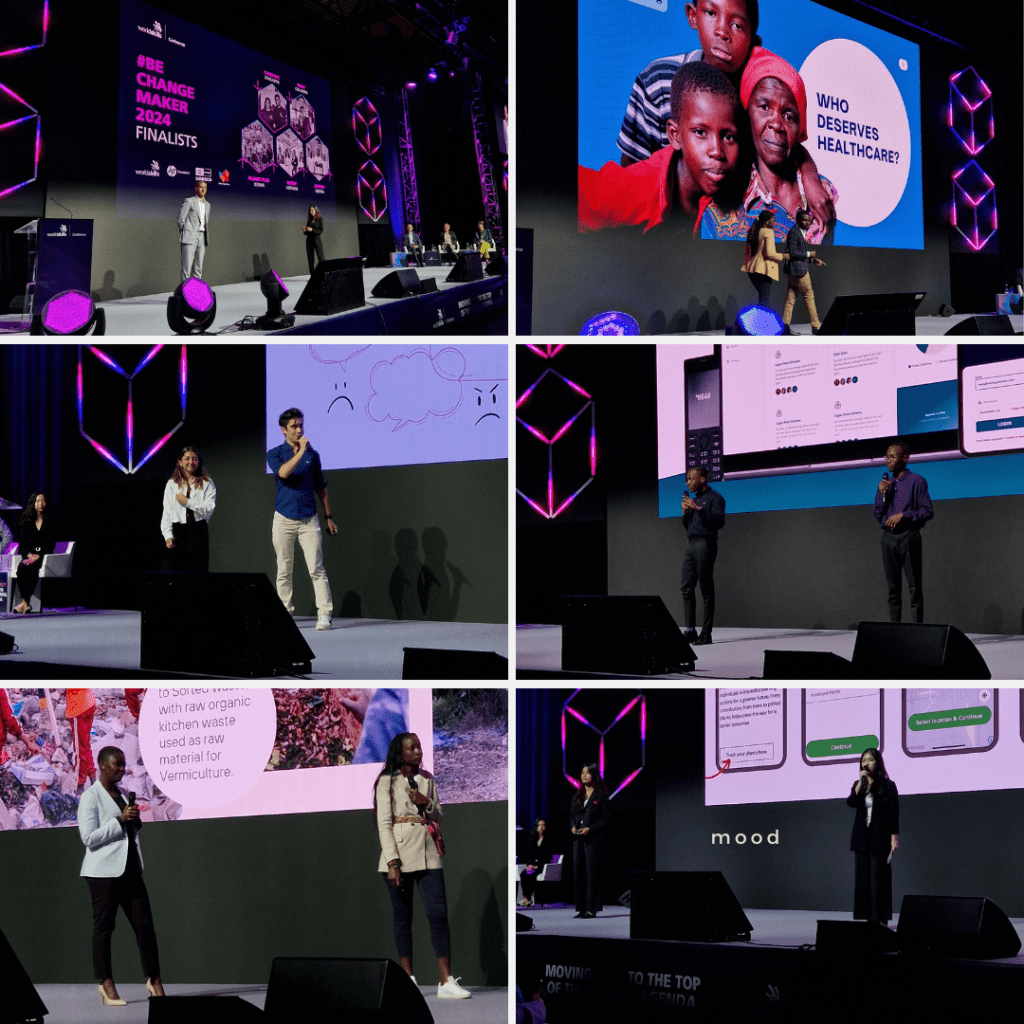
1:30 p.m.
Team RiceUp from Vietnam have developed a rice-based product and packaging initiative.
Team Planet Plus from Kenya have created biodegradable bags for recollection and composting.
Team Sekofia from Nigeria have created a Software-as-a-Service (SaaS) health insurance management platform that connects patients, healthcare providers and insurance companies.
Team Holly from Colombia is creating an innovative solution to address emotional wellbeing, helping young people believe in themselves.
Team CarePlug from Zimbabwe takes the stage. They present on their telemedicine platform featuring a state-of-the-art EHR system aimed at bridging the healthcare gap.
1 p.m.
BECHANGEMAKER FINAL PITCH
BeChangeMaker is a social entrepreneurship programme presented by WorldSkills and HP LIFE, supported by UNESCO-UNEVOC. This year, the programme received a RECORD-BREAKING 700 applications (715 from 83 countries and regions to be exact).
Five social entrepreneur teams from Zimbabwe ![]() , Colombia
, Colombia ![]() , Kenya
, Kenya ![]() , Vietnam
, Vietnam ![]() and Nigeria
and Nigeria ![]() begin their live pitch of their social business ideas to judges and a live audience representing policymakers, education and industry at WorldSkills Conference 2024, after months of learning, coaching, mentoring and finessing their social business ideas that will make a big impact in their communities and beyond.
begin their live pitch of their social business ideas to judges and a live audience representing policymakers, education and industry at WorldSkills Conference 2024, after months of learning, coaching, mentoring and finessing their social business ideas that will make a big impact in their communities and beyond.
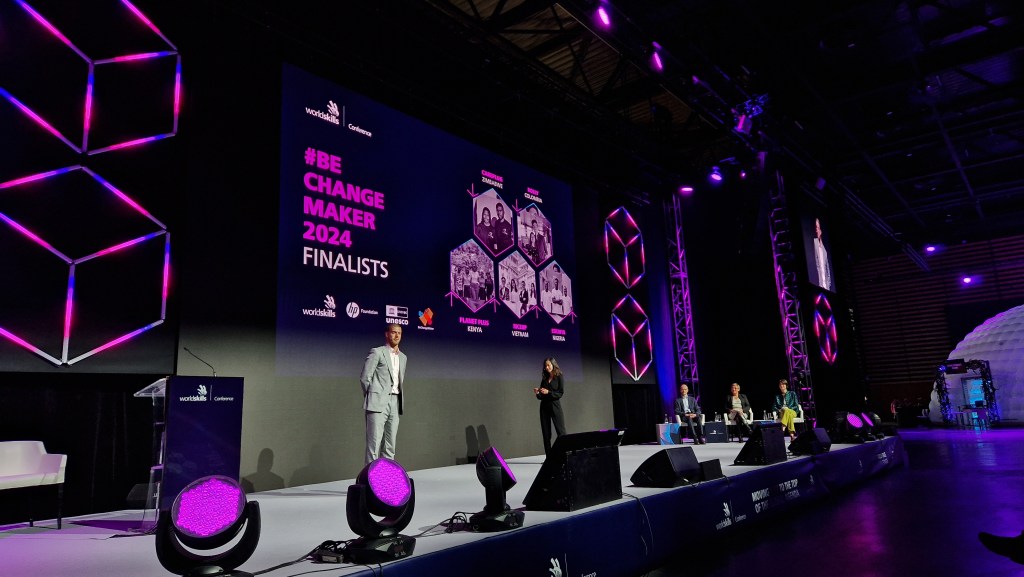
12 p.m.
brick-by-brick: foundational skills for better tvet
Millions of young people are failing to acquire foundational skills. Experts in this session discuss the potential of systems and institutions to address the gaps and reinforce foundational skills.
Hiromichi Katayama Programme Specialist, Section of Youth, Literacy and Skills Development, UNESCO, said: “Literacy is one of the key components of foundational skills, as well as social and emotional skills. Lifelong learning is another one of our key mandates, we published preliminary studies on lifelong learning and now we’re compiling best practices on how governments can support it. We believe in many countries, with ageing societies, it will remain critical for populations to continue learning.”
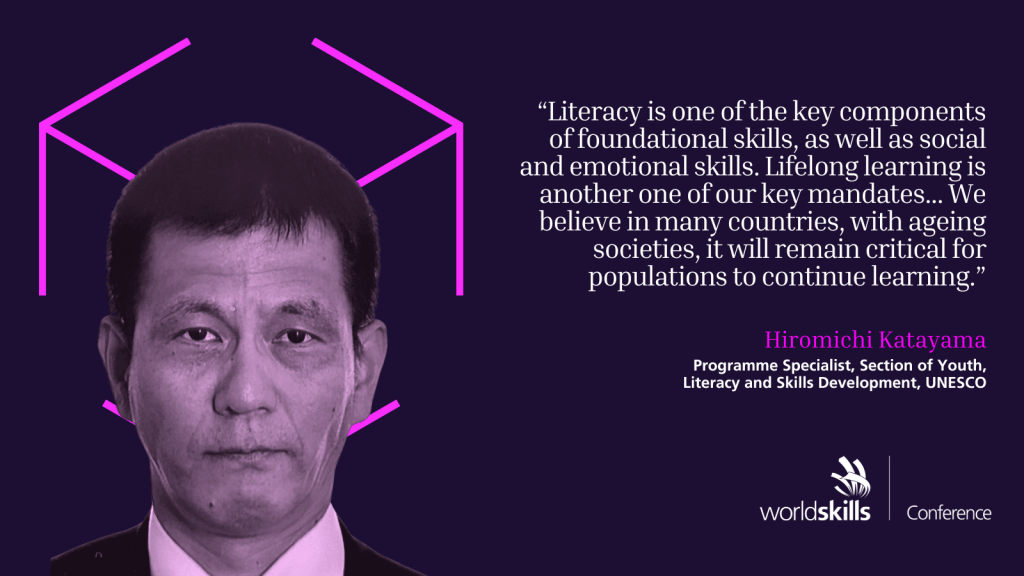
Mohamad Maliki Osman, Second Minister for Education, Singapore, said: “Recognize the skills of our TVET students, provide rightful remuneration, build a sense of value towards young people. It’s easy to lose the idea that TVET is equally, if not more, important than academia in building the economy. We must value students for their contribution. Also the flexibility of the system must respond to changes in the world today—how does one ready oneself right from the very beginning? We need to ensure the ecosystem recognizes diversity of talent that exists out there, and recognise the different pathways that exist.”
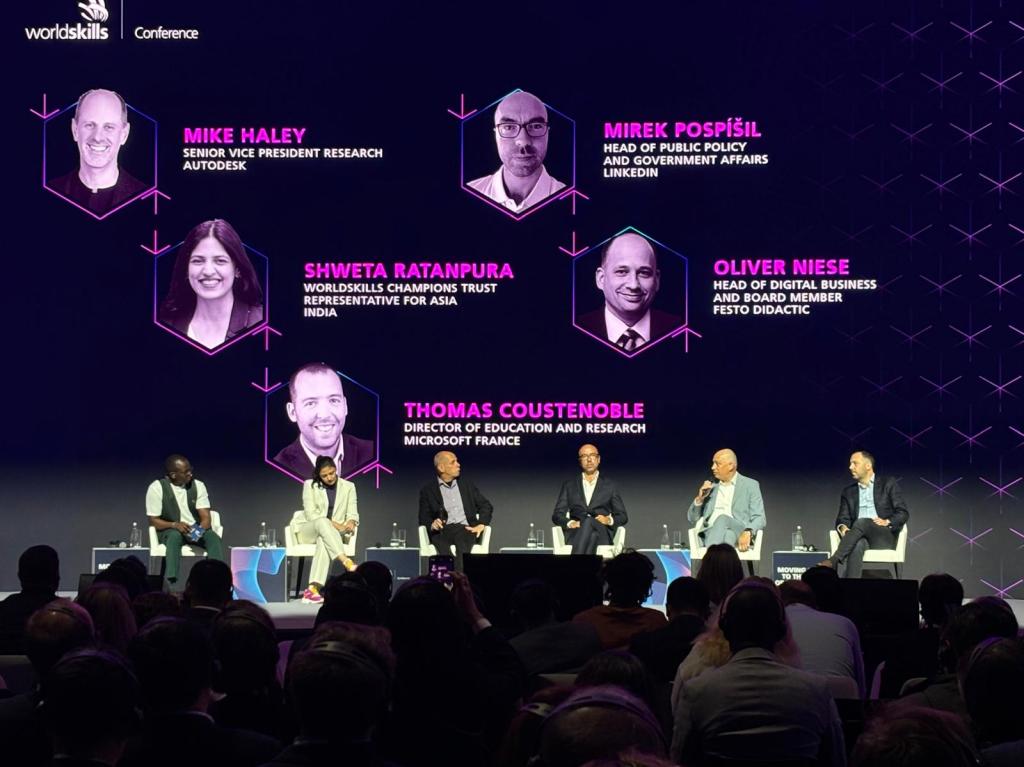
9:50 a.m.
Can education catch up? AI and the future of work
Day 2 of WorldSkills Conference 2024 kicked off with an exciting discussion on artificial intelligence and the future of work. Recognizing that AI will have an important role in the future of learning, this morning’s panelists will discuss how AI innovations will be disruptive not only for the world of work, but also for education. How can TVET adapt to the speed of industry and equip young people with the skills they need? How will big data steer education and the workforce in the future?
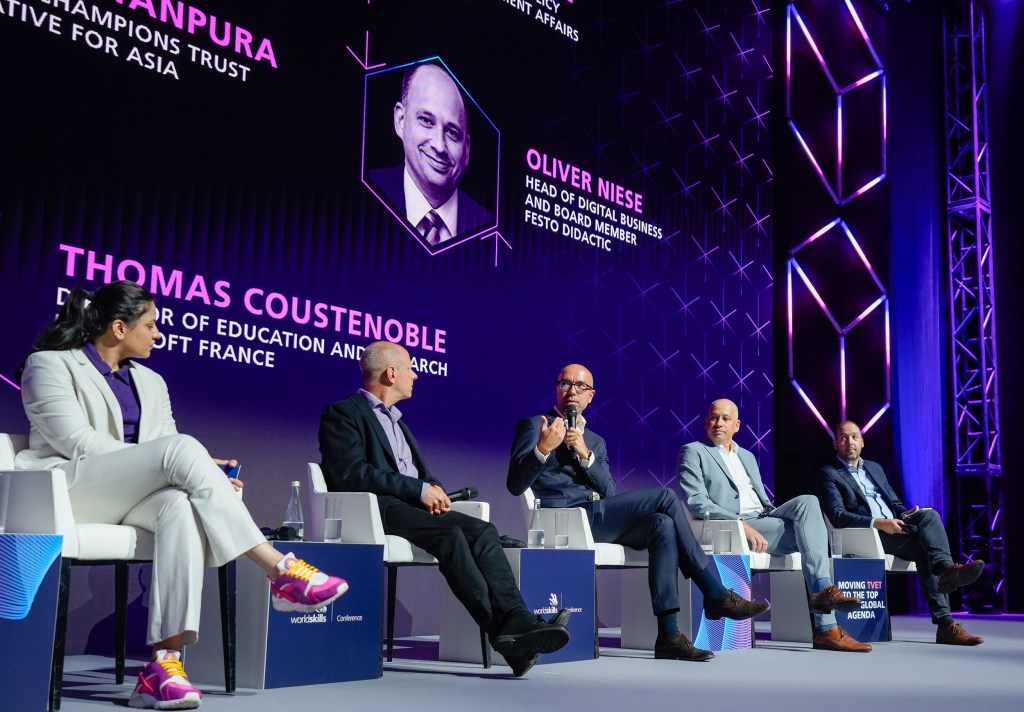
Insights from day 1

5:30 p.m.
Displacement, Climate Change and Conflict: Skills Initiatives for Fragile Economies
“We address issues in countries facing emergencies and recovering from crises through collaboration—by working with other UN agencies and with the support of other countries, but we also use previous learnings from displaced migrant populations who have been living on the land for generations.” – Fabio Jiménez, Head of Labour Mobility and Markets Unit, Labour Mobility Division, International Organization for Migration IOM.
4:45 p.m.
Reimagining Workplaces, Cultivating Inclusion: Attracting More Women into STEM
“As a UN agency, we work in a multi-layered way with member states to ensure no-one is left behind, with a focus on strengthening TVET institutions and co-operation between them. We help governments to build policies that mainstream gender equality and prepare the workforce for the green economy. In a few countries, we provide capacity-building for teachers on gender-responsive TVET, because teachers cannot teach what they do not know. At the same time, we work with children to help them challenge gender stereotypes in different ways.” – Priscilla Gatonye, UNESCO-UNEVOC.
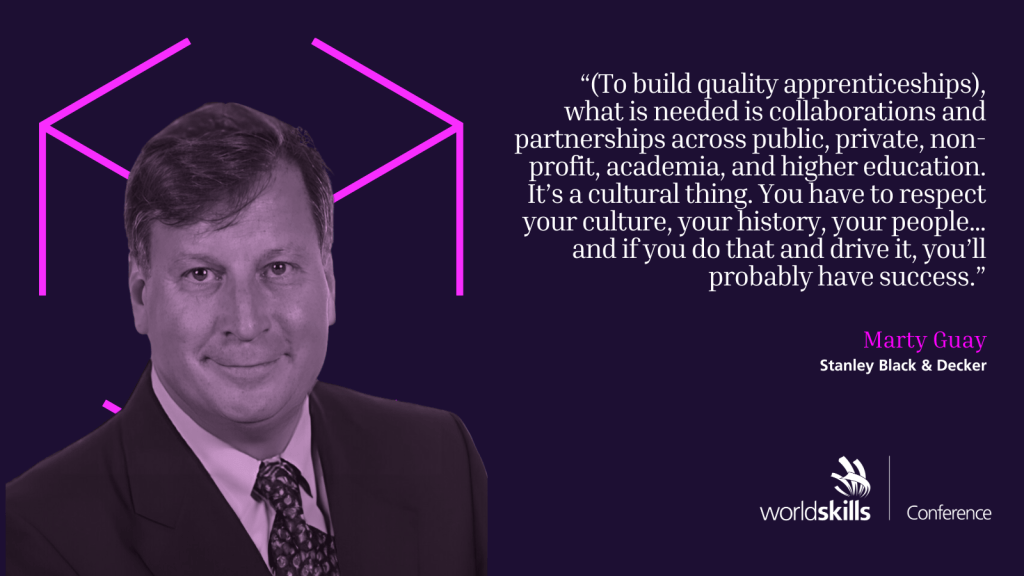
4:40 p.m.
Collaborating towards success: Tools and Strategies for Quality Assurance in TVET
“(To build quality apprenticeships), what is needed is collaborations and partnerships across public, private, non-profit, academia, and higher education. It’s a cultural thing. You have to respect your culture, your history, your people… and if you do that and drive it, you’ll probably have success.” – Marty Guay – Stanley Black & Decker.
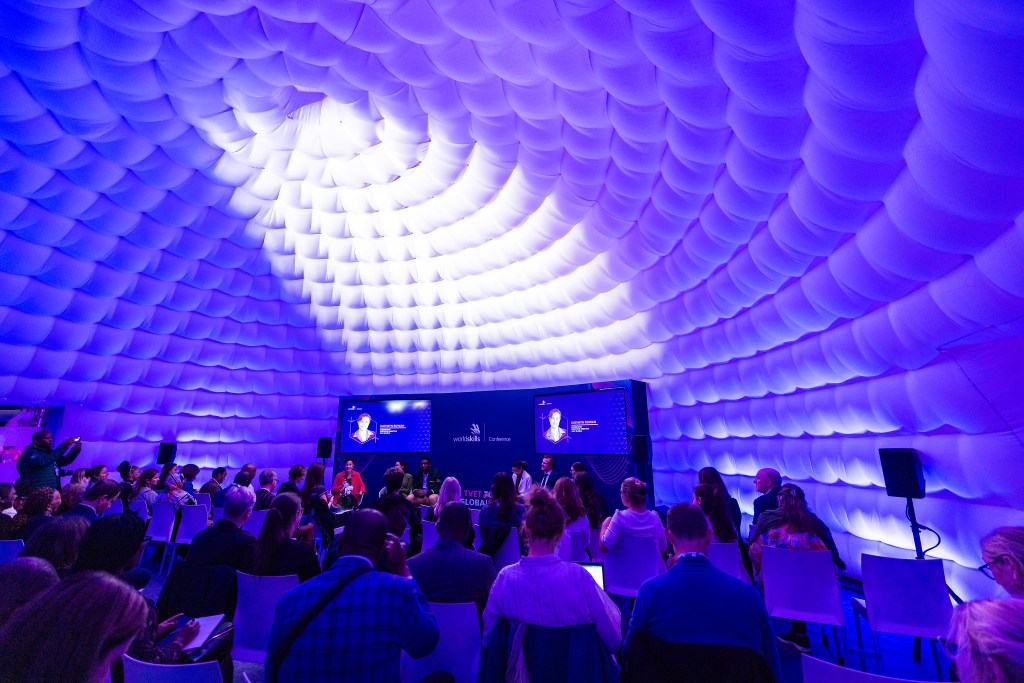
Following the morning sessions, attendees got a chance to take in Curated Competition Visits—watching 1,400 Competitors in their element for day 1 of WorldSkills Competition.
12:55 p.m.
Questions from the audience:
- How do we make green skills more attractive to young people who still see industries like oil as “secure” compared to green sectors?
- Meeting the green transition is not about inventing new green skills, it’s about upskilling and adapting the skills we already have. How do we do this?
“We need to make green skills more attractive to young people and focus on youth perceptions,” said Andy Hurst, Vice President Global Sales, Festo Didactic, Germany.
“It’s also true that we already have many of the skills we need to meet the green transition.”
12:20 p.m.
Breaking Stereotypes: Building Gender Equity in Skills
“Women that study STEM go into it but then leave after a few years because they’re not comfortable with the working environment. There’s work that needs to be done to improve the workplace for both genders. This is an aspect we’ve been promoting in TVET and at higher education level. We’ve been working on a task force on talent in tech area with the US and we’ve seen there are differences between US and EU and how we can learn from that. This is also a way of thinking about how we can work better: partnerships, and also funding. We have been funding projects that help in TVET and support through guidance, mentoring, and accompanying people into the job,” said Manuela Geleng Director for Skills, European Commission.
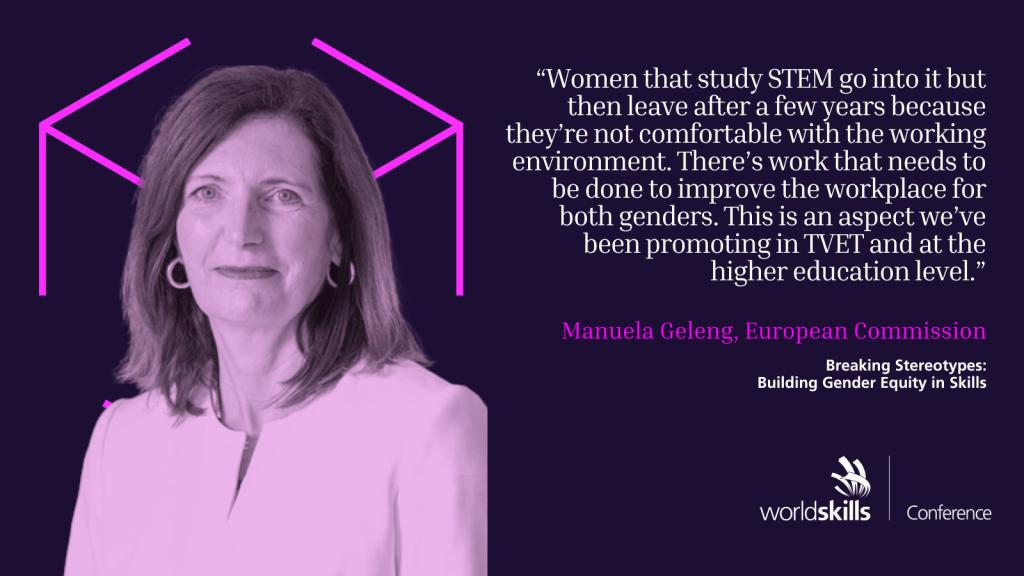
“We talk about D&I and if we don’t talk about inclusion we’re not covering it. People need to have a voice and take part in decision making, and have career development. It goes far beyond entrance into the workplace. Two key areas are career guidance and apprenticeships. Career guidance needs to include employers. Apprenticeships: employers should expand them as they’re still limited, also the financial incentive for apprentices. We lose the men and the women once they’re in if there’s not a clear intention,” said El Iza Mohamedou Head of Centre for Skills, OECD.
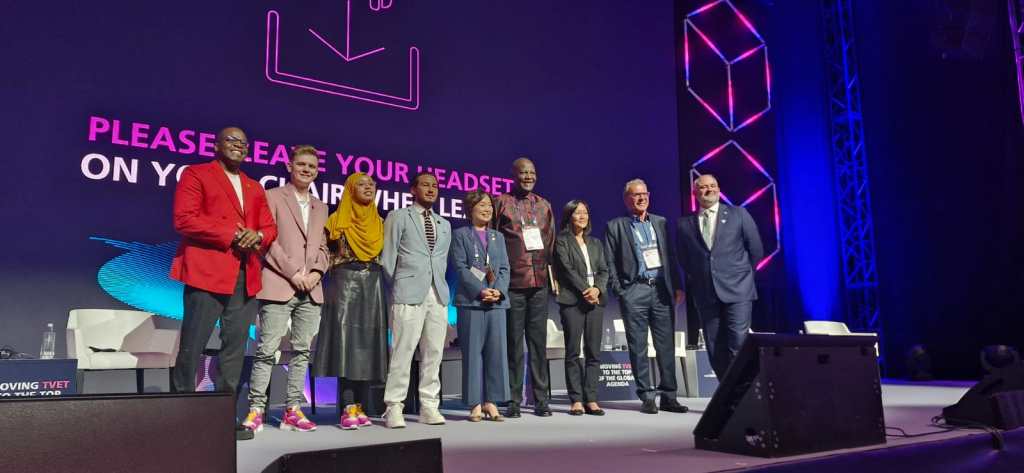
11:55 a.m.
Raising the Bar: How do we create excellence in every TVET system?
Georgie Ndirangu: “What is the key for excellence in TVET for you?”
“For me, we have to look at the outcome. We are talking about systems that need to be responsive to employers, students, and the larger economy, to serve national development needs,” – Xiaoyan Liang Lead Education Specialist and focal person for Skills and Technical and Vocational Education and Training (TVET), World Bank.
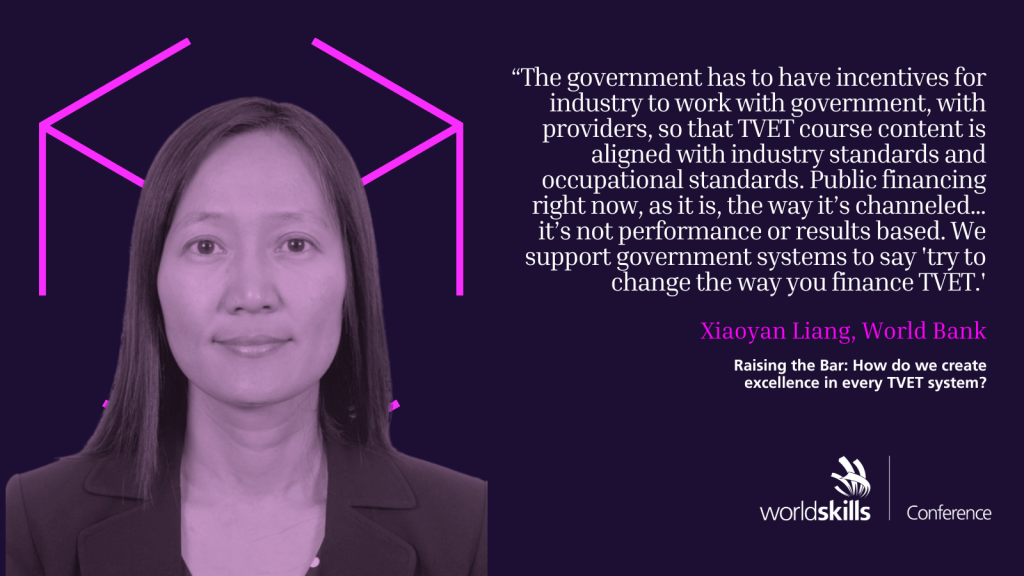
“We’re the largest international development financing institution… we have 230 projects in TVET all over the world with around $39 billion dollars. This gives us lots of expertise in compiling data and knowledge on what makes excellence in TVET systems. We have to assume TVET needs to build on a very strong foundation before it can be excellent. That’s number one. Number two is that the government has to have incentives for industry to work with the government, with providers, so that TVET course content is aligned with industry standards and occupational standards. Also we need to look into governance and financing aspects – public financing right now, as it is, the way it’s channeled… it’s not performance or results based. We support government systems to say ‘try to change the way you finance TVET’” said Xiaoyan.
“At the strategy level we have specific gender, disability, and people from vulnerable backgrounds… how we can reduce barriers to access and ensure quality of access is clear for those people? We have projects targeting to create regional integrations so that students can move between countries. We also support programmes between global south and north, which is becoming increasingly powerful in terms of bridging the gap.”
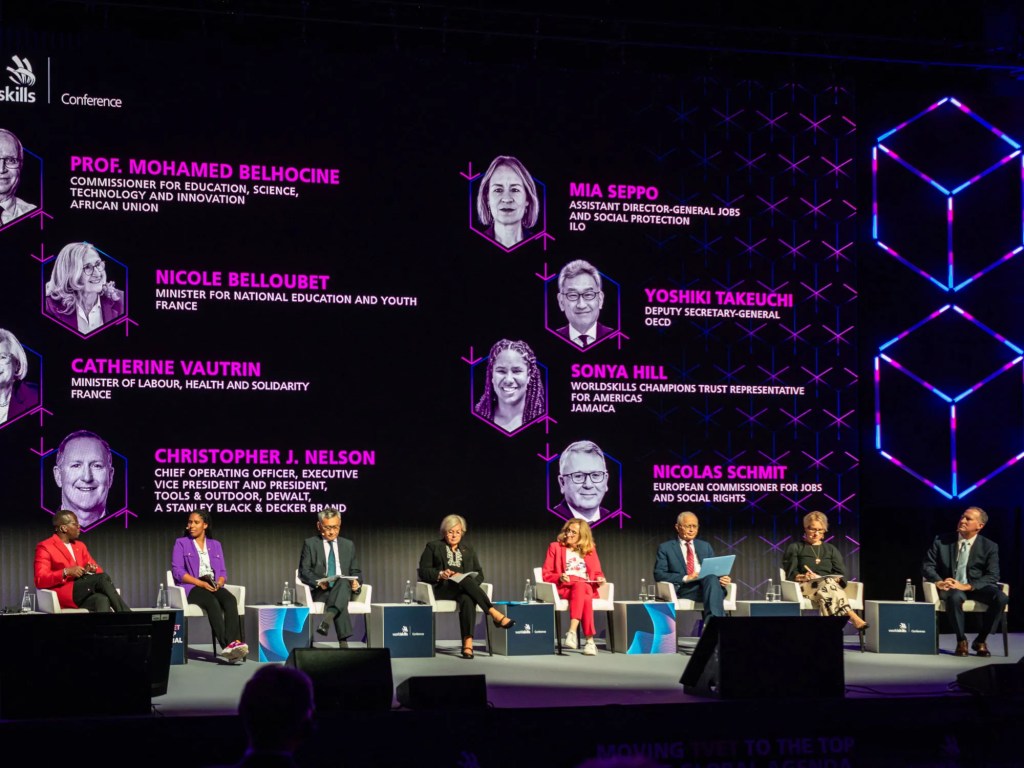
10:15 a.m.
“TVET is a tool to address the disconnect between jobs, skills, and people’s aspirations. When used appropriately, it empowers people to have fulfilling careers, helps enterprises find people with skills, and supports economies to reach a sustainable development path.” – Mia Seppo, Assistant Director General, International Labour Organization (ILO)
“Youths play a crucial and influential role in shaping career choices of their peers. Growing up in Jamaica, TVET was always a career path for people who struggle financially or educationally… these misconceptions have discouraged young people from considering TVET as a viable career option. However, in my experience, those who have gone through TVET training have become successful and have the power to change the narrative.” – Sonya Hill, WorldSkills Champions Trust representative for Americas
“When we talk about policies, it is data we should start with. When it comes to TVET, do we have enough good data? Yes we have some, but not enough. At OECD, we are proud of being a good collector of data, and of inventing a PISA-VET system to collect data and help us know what is needed for TVET to improve.” – Yoshiki Takeuchi, Deputy Secretary-General, OECD
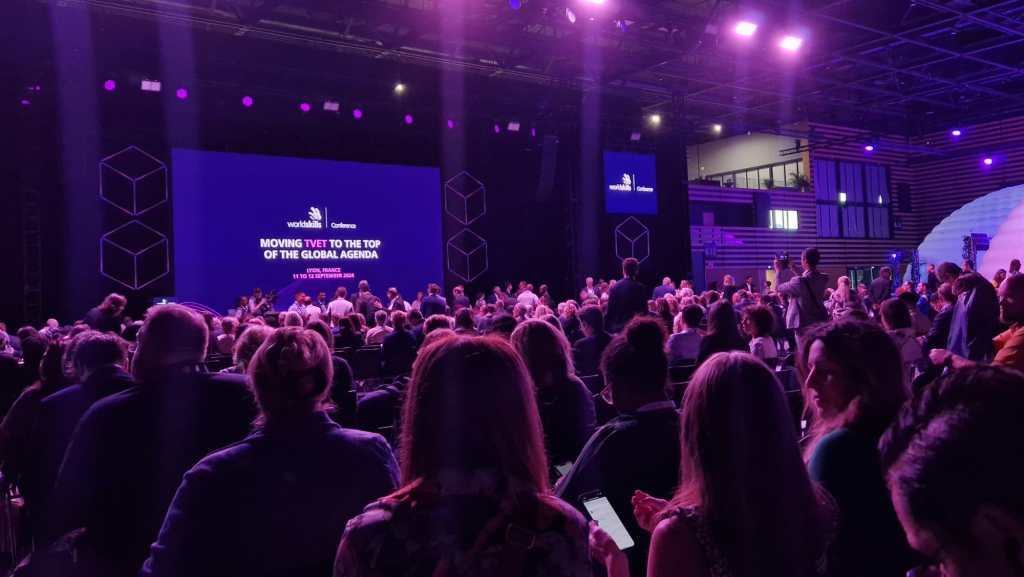
10 a.m.
“This Conference is just weeks ahead of the extraordinary UN Summit of the Future, where world leaders will gather to forge consensus on how to safeguard all our futures. Too often, skills development has not had sufficient recognition to reflect the economic and societal return on investment they produce. We are on a mission to change that,” said Chris Humphries, WorldSkills President.
He invited delegates to work better together, saying, “Moving TVET to the top of the global agenda, requires a collective effort that extends beyond this event. And that is why we want everyone to join our mission to inject excellence into every TVET system around the world. We need to create more opportunities for young people to travel their own pathways to excellence. One where they will be better equipped to meet the challenges of the future thanks to their technical and life skills. And through the process they will become more resilient, more confident, and more accomplished.”

9:40 a.m.
The day began with an urgent and inspiring welcome speeches from Catherine Vautrin, Minister for Labour, Health and Solidarity in France and Nicole Belloubet, Minister for National Education and Youth in France, along with inspiring remarks from Chris Humphries, President of WorldSkills.
“We are together to celebrate what is achieved by each of the countries here, who are building our future using their skills and talent. This is not only a Competition of people, but also a springboard for youth across generations. Competitors across the world will be able to go beyond their limits, and they are showing us that they are ready to step up to the challenge of the future. This event will enable us to be able to speak amongst ourselves, speak, exchange ideas, and that is a lever to ensure the technology will move forward. They are crucial in developing vocational skills and ensuring our world can shift into its new era. WorldSkills shows in concrete terms that excellence can really find itself at the heart of many different sectors.” – Catherine Vautrin, Minister for Labour, Health and Solidarity
“Beyond the Competition, we’re meeting at a key moment where the world of work and TVET are being transformed through economic and social changes, and challenges of the environment and digital transitions. It’s our responsibility as decision makers to rethink the future of vocational education and training and anticipate the needs of the future, to ensure the continued prosperity of our economies and to meet increasing demands. We must be able to guarantee that young people will have quality education and training in line with their aspirations and ensure they have a place in tomorrow’s society.” – Nicole Belloubet, Minister for National Education and Youth
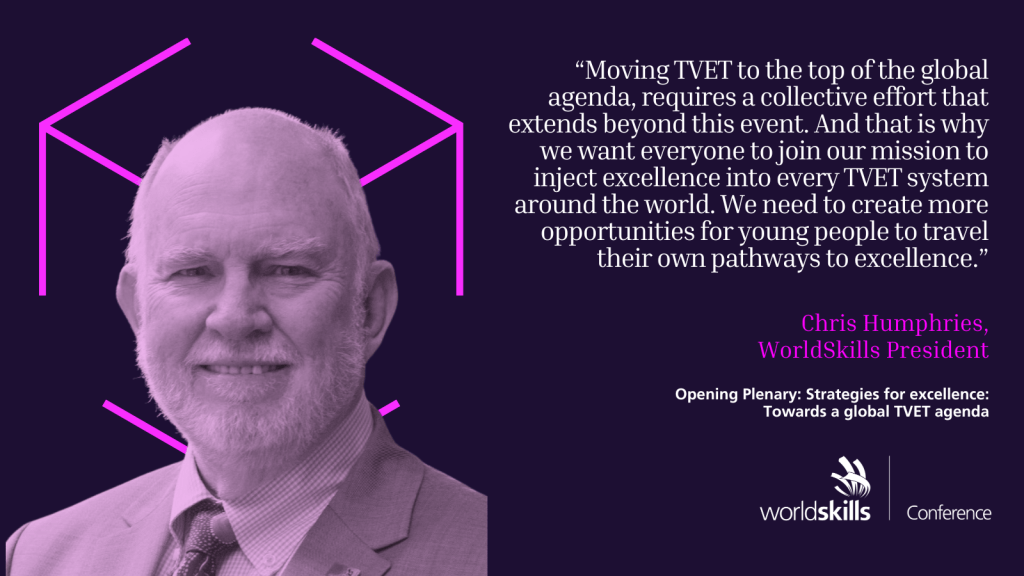
9:30 a.m.
The Opening Session will begin shortly! The room is still filling up with attendees.
Thank you for your patience.
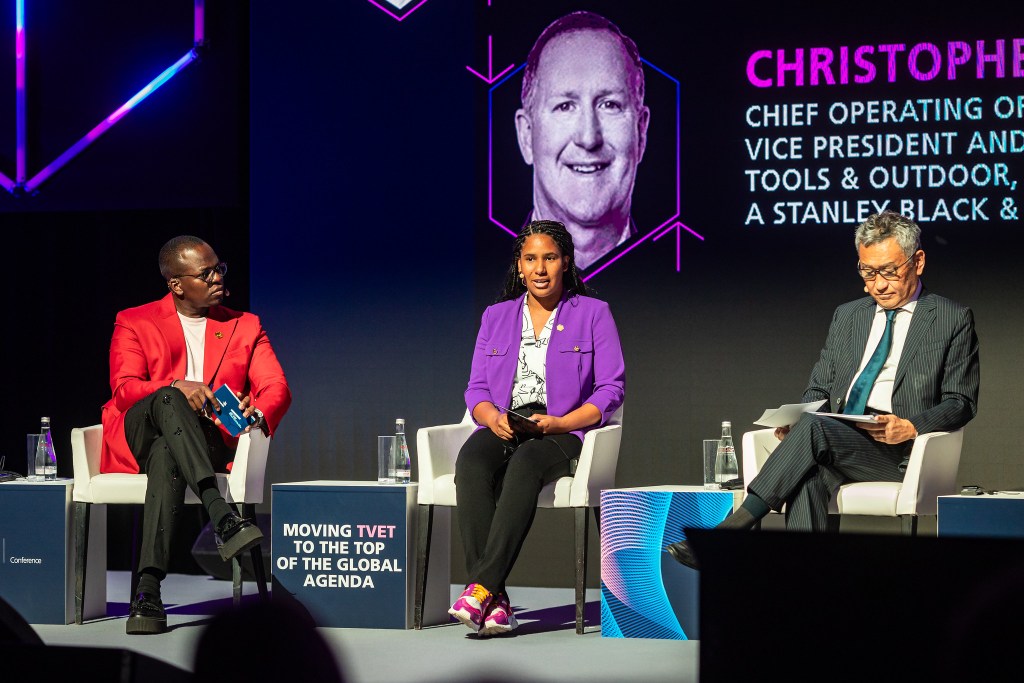
WATCH THE OPENING PLENARY LIVE ONLINE – 09:00 CEST (GMT+2).

Opening Session Details
- Key stakeholders in the TVET landscape will explore the necessary next steps to move the global TVET agenda forward and create concrete action for countries to strengthen their TVET systems.This opening session includes welcome speeches from Ministers in charge of Labour and National Education, France along with Chris Humphries, President, WorldSkills International.
- Award-winning journalist Georgie Ndirangu will moderate the panel of six international experts:
- Nicolas Schmit, European Commissioner for Jobs and Social Rights
- Prof. Mohamed Belhocine, Commissioner for Education, Science, Technology and Innovation, African Union
- Mia Seppo, Assistant Director General, International Labour Organization (ILO)
- Yoshiki Takeuchi, Deputy Secretary-General, OECD
- Christopher J. Nelson, Chief Operating Officer, Stanley Black & Decker
- Sonya Hill, WorldSkills Champions Trust representative for Americas

